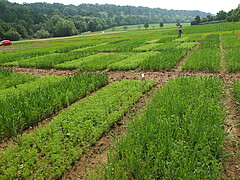Old lentils rediscovered:
Researchers select cultivar types for cultivation in Germany [23.02.22]
8 March 2022, 10 a.m.-5 p.m: Digital LinSel Conference 2022 The Center for Organic Farming at the University of Hohenheim invites lentil enthusiasts to an exchange.
Vegetable protein from domestic fields – lentils are a true "superfood". However, the old crop is rarely grown in German fields: Overly complicated harvest, insufficient yield. The LinSel research group, coordinated by the Center for Organic Farming at the University of Hohenheim in Stuttgart, wants to change that. At the conference, it will present what are known as genotypes that are suitable as cultivar precursors for domestic cultivation. Another priority area has to do with the possibilities of propagating and cultivating them in Germany. Further information at oeko.uni-hohenheim.de/linsel_konferenz
The rediscovery of the Swabian "Albleisa" about 20 years ago was the trigger for new research on these lentils. Researchers are interested in how to bring the ancient crop back to domestic fields in order to shorten supply routes. To this end, they are looking into the question of which genotypes are suitable for central European conditions.
Together with both Departments of General Agronomy and Quality of Plant Products of the Institute of Crop Science at the University of Hohenheim, the Leibniz Institute of Plant Genetics and Crop Plant Research (IPK) Gatersleben, the Keyserlingk Institute, and the University of Kassel, the Center for Organic Farming at the University of Hohenheim has identified genotypes suitable for cultivation in Germany.
From the laboratory to the test site and the field
Over a three-year period, the research project has selected suitable lentil genotypes for domestic cultivation. Initially, the IPK examined 110 provenances that were stored in the gene bank. The researchers analyzed which lentils are competitive and have the potential to offer a high-yield crop.
The selected provenances were then forwarded to the University of Hohenheim. Cultivation on the test sites aimed to demonstrate how the lentils develop in the field and whether the old cultivars are robust enough to withstand current climate conditions.
The Keyserlingk Institute tested "on farm" on a larger plot how competitive the lentil genotypes are, what diseases can occur, and how much yield the plants produce. Technical parameters that are important for cultivation also played a role here: How easily can different genotypes be harvested and how much of the harvested crop is left at the end? Researchers from the Department of Ecological Agricultural Sciences at the University of Kassel investigated how cultivar types adapt to different locations over several years and what role factors such as environmental conditions, soil, and climate play in this process.
The harvested crop is then returned to Hohenheim. Here, researchers in the laboratory analyzed, among other things, the protein content and the thousand grain weight – an important parameter in the seed trade.
Old cultivar types offer surprising potential
In the end, six to eight cultivars or genotypes remained that have great potential for regional cultivation. Alex Kröper, a research associate at the University of Hohenheim, accompanied the trial cultivation at the Center for Organic Farming at the University of Hohenheim: "We found some gene bank accessions, some of them old, that performed better in the trial than regionally grown comparative cultivars. These cultivars offer good preconditions for successful cultivation in Germany."
He said that the challenge was now to get the selected lentils onto agricultural land. "Among farmers, lentils are still seen as unattractive and difficult to harvest. Because the plant has not been cultivated in Germany for a long time, it is not adapted to our modern agricultural systems. Professional propagation is still in its infancy," said Dr. Sabine Zikeli, project coordinator at the Center for Organic Farming. "That's why we're also looking to actively engage with farmers at our conference about propagating and marketing native lentils."
The LinSel conference provides fresh stimulus for agricultural use
At the LinSel conference, the project partners will explain the results of the individual research stages and present the selected lentils. Further impetus is provided by researchers from Switzerland and Canada, who have also conducted field experiments with various lentil crops. Various workshops likewise focus on carrying over the research findings into practice in domestic fields. To this end, lentil experts share their knowledge of the entire value chain of the crop – from breeding and propagation of cultivar types to the benefits of producer groups and marketing.
BACKGROUND: The rediscovery of the Swabian Alblinse
Until the 1950s, the Swabian Alb was a cultivation area for regional lentil cultivars. However, due to the laborious harvesting and low yield, the lentil disappeared from the fields over the course of time. Until the 1980s, when an organic farmer – Woldemar Mammel, known among lentil enthusiasts as the "Lentil pope" – set his mind to bringing lentils back to Swabian agriculture.
Since the old Swabian cultivars seemed to have died out, Mammel first cultivated other lentil cultivars. However, he could not get the Alblinse out of his head – he searched for the regional cultivar for decades. In 2006, it was finally located in the Vavilov gene bank in St. Petersburg. Mammel personally traveled to Russia to collect the Alblinse. Since then, the Swabian lentil has been growing again on the Swabian Alb. Since the demand for the regional lentil grew quickly, the producer association "Alb-Leisa" was founded. It now has more than 110 member farms.
Prof. Dr. Sabine Gruber from the University of Hohenheim shared the enthusiasm for lentil cultivation in the Swabian Alb and established the core research area at the Institute of Crop Science, Department of General Agronomy. The close exchange with lentil growers inspired her to conduct extensive research on old and new cultivars until her death.
Additional information
Text: Hagenau / Elsner
Contact for press:
Dr. Annegret Pflugfelder, University of Hohenheim, Center for Organic Farming,
T +49 711 459-24139, E a.pflugfelder@uni-hohenheim.de


